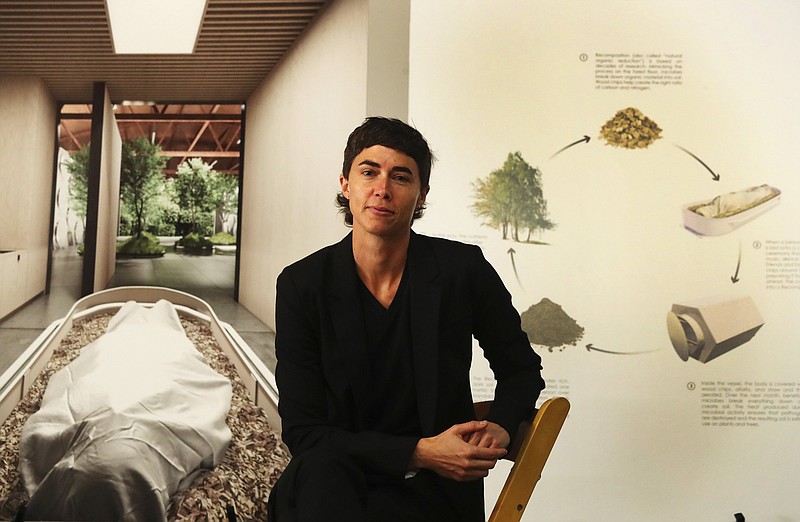One recent evening, around 75 people gathered in a vast Sodo warehouse for an event that may have been the first of its kind in human history: a housewarming party for a funeral home where bodies would not be burned or buried, but laid in individual vessels to become clean, usable compost.
It was an eclectic group (doctors, architects, funeral directors, state legislators, lawyers, investors), but they had come together to celebrate the first site for Recompose, the fledgling Seattle company that hopes to change the way people think about what happens after we die.
"You all have one thing in common," Katrina Spade, founder and CEO of Recompose, told the crowd beneath the mammoth, curved wood ceiling. "You are all members of the death-care revolution."
But for some at the party, it took a little time to get there.
"Six years ago, Katrina walked into our studio and had the craziest idea I'd ever heard," said Alan Maskin, a principal and owner of architecture firm Olson Kundig. "I had this transition of shock from 'oh my God I'm going to die' to thinking this is something I need to do - something the world needs to do."
A lot has happened since that conversation. Spade founded and dissolved a precursor nonprofit called the Urban Death Project; partnered with soil scientist Lynne Carpenter-Boggs at Washington State University who led a successful research trial (using the remains of six people who'd volunteered their bodies for the study); and convinced legislators to change state law about the disposition of the dead. That law was signed this summer and goes into effect in May, 2020. Recompose plans to open the following spring with a price of $5,500 per recomposition, setting it well above basic, no-service cremation but below most conventional funerals.
In just the past few months, Recompose has signed the lease on its 18,500 square-foot Sodo home, hired Olson Kundig to design it, secured around half of its $6.75 million investment goal, and found an answer to one of its stickier operational problems: what to do with all that soil.
When composted, a human body (plus the starter materials of wood chips, alfalfa and straw) yields about 1 cubic yard of soil - that's several wheelbarrows full.
Families of the deceased might use all, some or none of it. Some Recompose supporters, like Sonia Baker and Wes McMahan, know what they want to do with their soil: nourish trees (apple and maple, respectively). Others like the idea of becoming compost, which is far more environmentally sound than cremation or burial, but don't know if their loved ones need a few wheelbarrows of it.
Dr. Kathleen O'Connell, a member of the Recompose volunteer advisory board, said she first learned about the idea from a patient.
Two years ago, Dr. O'Connell was working at the Seattle VA hospital and got to know a veteran in the hospice unit. "He was someone who didn't have a lot of social support," she said. "He was struggling with wrapping his mind around the end of life, and had so many existential distresses."
But one thing, she said, gave him peace: the fact that he had joined a pilot project to study whether human bodies could be turned into safe, rich compost. That was Carpenter-Boggs' research trial, which the veteran had learned about from a social worker. He volunteered and, to his great relief, was accepted.
"He would just light up when talking about it," Dr. O'Connell said. "It was very striking watching him over a period of six months process everything in one difficult light, but then how much peace he had knowing what was going to happen to his body, that his last act would be giving back to nature - that he would be doing something good."
Recompose still has some goals ahead: to raise enough capital from the kinds of investors who not only see the business opportunity, but believe in the mission; and testing is still underway to perfect the vessel-composting system. (Spade says the goal is to have a consistent process that takes 30 days or fewer.) But for now, Recompose is satisfied with its momentum even if it can't take down payments quite yet.

